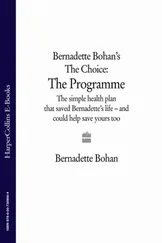"Where are you, it's so noisy? It sounds like a train station."
"Talk to you soon," he says, lying.
When he gets off the phone, Cecelia is shaking her head and clucking. "People don't make those calls during the week — only nights and weekends."
He looks puzzled.
"Free nights and weekends," Cecelia says.
The phone rings. "I'll get it," he calls.
Cecelia already has it. She has picked it up behind his back, literally. "Yes," Cecelia says. "There's always someone here. Thank you." She hangs up.
"Who was that?"
"The florist, wanting to know if there's someone home to receive a delivery. They tried to deliver to the hospital, but you weren't there. Is there something you want to tell me? Whatever it is, I'm not surprised. I figured something was going to happen to you — you didn't leave the house for almost a month."
"Is that true?"
Cecelia nods. "Twenty-four days, I counted. I was going to say something and then I figured it wasn't my place. You sat in front of that computer for so long, I thought you'd start glowing in the dark."
She is spraying the counters with Fantastik.
"Do you clean every day?"
"Different things on different days, there's always something to do."
"And what do I normally do?"
"You sit at your computer with those things on your head. Sometimes people come to see you, sometimes people you used to work with, sometimes those art people trying to sell you things, they show you pictures of paintings."
He nods. "And then?"
"You don't buy anything. You used to, but you haven't bought anything in years."
From the bedroom, with the door closed, he calls to make his doctor appointment.
"I can put you in with Dr. Anderson two weeks from tomorrow, at eleven a.m."
"I don't think I'll last that long."
"If it's an emergency, you should go to the emergency room."
"I just came home from the emergency room — they told me to call my doctor as soon as possible."
"Why didn't you say so? I can put you in with the new fellow, Dr. Lusardi, this afternoon."
"The new fellow is fine; he's a doctor, right?"
"Oh, he's more than a doctor — he's everything. We'll see you at three-thirty. Be sure to get a parking ticket so we can validate you."
HE CHANGES his clothes and goes into the exercise room. The trainer is already there. That's how it goes, they don't keep you waiting, it's all about convenience, your schedule — you.
"How are you?" she asks as he lies down on the mat.
"I didn't do the treadmill this morning," he says. It is probably the first morning in years that he hasn't been on the treadmill.
"It's OK to take a day off," the trainer says.
"I didn't take a day off, I missed a day," he says. "It's different."
She lifts his leg. "How does that feel? Am I getting to you?"
He nods.
"Where are you feeling it, hamstring?"
"More in the calf."
"How about now?" She adjusts the leg.
They have a strange conversation, about the minutiae of muscles, about the feelings in his quads, in the glutes, if the sinuses are clear. The conversation is at once intimate and incredibly distant, it is not about his body but about the body.
"You have a big bruise on the hand," she says.
"It's from last night," he says, nonspecifically.
Halfway through, as she's bending his leg up over his head, he begins to feel it again — the pain.
"You're sweating," she says. "A lot."
Is he sweating? He's crying. Soundless tears are running down his face.
"Oh no," she says. "What's wrong, did I hurt you?"
Only when she says that — Did I hurt you? — does it turn to a choking kind of cry. As someone who never cries, he never knew he had so many different kinds of cries in him.
He is crying and she is patting him on the back like she is burping him. "Are you all right? Maybe we loosened up something that was trapped in there — maybe it's a good thing."
He is still crying.
"Do you need a hug?"
He shakes his head no and stops crying.
"Let's do something different. Can you lie on your stomach?"
He is happy to turn away, to lie facedown. "I didn't feel well last night," he confesses. "I went to the hospital. I guess I'm not over it."
"You should have called me," she says. "We could have rescheduled."
"I didn't want to cancel," he says. "I wanted to keep everything the same as always, except I can't."
"It's OK," she says. The same small words they said last night as they lifted the stretcher into the ambulance. He was glad they were there, that group of men, an impromptu powwow, taking him seriously, not telling him to snap out of it, pull himself together, keep marching.
She rolls him over onto his back. "Give yourself over to it," she says. "It's OK. Sometimes it just has to come out."
THE FLOWERS arrive while the trainer is there. The flowers of death, lilies, enormous smelly lilies, sickly sweet. Cecelia brings them in to show him, and then takes them away to find a vase. After the session he goes into the living room. They are on the coffee table, looking large, grotesque, out of place.
He is standing at the glass, looking out, and doesn't see it coming until it's too late. A bird dive-bombs. They are eye to eye, and then, with a thick thud, it hits the glass. Right in front of him — 100 percent living — it hits the glass, and — 100 percent dead — it falls to the ground. He goes into the kitchen, finds a big spoon, goes outside, digs a hole, and buries the bird. He goes back into the house, gets the flowers, and puts them on the grave.
Later, she calls. "I only have a minute," she says. "You really are something. I got no sleep last night. You always were a hypochondriac: your neck, your back, your headaches."
"That's not what they said at the hospital — no one called me a hypochondriac."
"They were being polite," she says.
"I talked to Ben this morning."
"Did he tell you about the trip?"
"What trip?"
He's going to drive cross-country, like On the Road. Ben and Barth, the first cousins, together for the summer. I told them they could use my car."
"The Porsche?"
"No, I sold that long ago — a Volvo wagon."
"Sounds like fun."
"They're planning to spend the summer in California."
There is silence; Ben didn't mention it to him; maybe Ben doesn't want him to know. Ben in California: it's thrilling, it's terrifying. Now's his chance, and he feels like he's already blown it.
"Thanks for the flowers," he says. "I already used them."
"Did I send flowers? That was nice of me."
"Nice to know you have feelings for me."
"I have feelings, Richard, I just never have time."
AFTER LUNCH, the woman comes to talk about the color of the guest room. She moves through the space, touching the walls, getting a feel for things. "Did you decide what this room is for? We need a purpose before we can give it a personality."
It was supposed to be Ben's room. Thirteen years ago, when Richard bought the house, he excitedly went shopping for the stuff of a boy's room: a bed shaped like a car, a carpet that had a road woven into it, trucks to push around, things a young little boy would like. It would be ready by Christmas, and then he would fly to New York and pick up Ben, who was still too young to fly alone, and come back out for a couple of weeks. But then she got an invitation to go somewhere; wherever it was sounded better than what he could offer — he'd be selfish if he said no.
"You'll have him another time," she had said. "There are a lot of Christmases to come."
And he put a temporary stop on the furniture order. And then it was spring vacation, and Ben had a cold and couldn't fly, and then it was summer, and there was another reason. And what was supposed to be a visit every month became every two or three, and Richard would go to New York for a week or so and come back feeling worse, and once or twice Ben came to L.A., but it never felt right, never felt like home. And now it was just a room, a plain room with a bed. Cecelia stayed there for a week during the riots, and every now and then, when she and her husband were having a bad time, she spent a night.
Читать дальше












